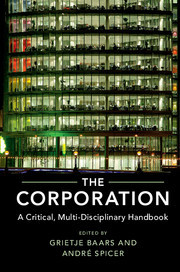Description
The Corporation
A Critical, Multi-Disciplinary Handbook
Coordinators: Baars Grietje, Spicer Andre
The first critical, interdisciplinary handbook in which leading experts critically debate crucial questions around the corporation.
Language: English
Subject for The Corporation:
Publication date: 03-2017
564 p. · 18x25.4 cm · Hardback
564 p. · 18x25.4 cm · Hardback
Description
/li>Contents
/li>Biography
/li>
The corporation has become an increasingly dominant force in contemporary society. However, comprehensive, in-depth analysis of the concept of the corporation is often restricted, or limited to one disciplinary approach. This handbook brings together the cutting-edge scholarship, expertise and insight of leading scholars in a wide range of disciplines, notably management studies, law, history, political science, anthropology, sociology and criminology, using a critical approach to dissect and understand the corporation. Ten chapters provide overviews of the state of play of critical scholarship on the corporation in each of these disciplines. Further contributors tackle current hot topics, such as corporate social responsibility, corporate crime, global value chains, financialization, and the interaction between corporations and communities. Finally, they consider resistance and alternatives to the corporation. With its interdisciplinary approach, this book is an invaluable resource for all readers studying the past, present and future of the corporation.
Introduction; Part I. Disciplinary Overviews: 1. The corporation in history; 2. The corporation in legal studies; 3. The corporation in economics; 4. The corporation in sociology; 5. The corporation in anthropology; 6. The corporation in political science; 7. The corporation in geography; 8. The corporation in accounting; 9. The corporation in management; Part II. Interdisciplinary Thematic Chapters: 10. The evolution of the corporate form; 10a. Between company and state: the Dutch East and West India Companies as brokers between war and profit; 10b. Early modern business projects and a forgotten history of corporate social responsibility; 10c. Finance and the origins of modern company law; 11. The multinational corporate group; 11a. The multinational as a corporate form: a critical contribution from organization studies; 11b. Embedding the multinational corporation in transnational sustainability governance; 11c. Banks as global corporations: from entities to 'ecological habitats'; 12. The financialization of the corporation; 11a. The structure and agency of financialization; 11b. Financialized business models and the corporation; 11c. Transnational corporations and the international tax haven and offshore finance system; 13. Corporate value chains; 13a. The nature of the firm in global value chains; 13b. The corporation and the global value chain; 13c. Global production networks and the changing corporation; 14. Corporate citizenship; 14a. The functions and dysfunctions of corporate social responsibility; 14b. Reconsidering the critical corporate social responsibility perspective through French pragmatic sociology: subverting corporate do-gooding for the common good?; 14c. Certification schemes and labelling as corporate governance: the value of silence; 15. The corporation and crime; 15a. The criminal corporate person; 15b. The FBI on corporate crime: examining the influence of corporate culture; 15c. Mental blockades in the recognition of mens rea in corporations; 16. The corporation and ideology; 16a. Bad parresia: CSR and corporate mystification today; 16b. Capital, corporate citizenship and legitimacy: the ideological force of 'corporate crime'; 16c. Corporate foundations and ideology; 17. Corporation and communities; 17a. Articulating and disarticulating corporation and community; 17b. Communities within and without of the corporation: control, power and interests; 17c. Coercion and corporate power: notes on class struggle in an Indian city; 18. Corporations and resistance; 18a. Organizing in the nervous system: global trade unions and global production networks; 18b. Rethinking workplace resistance: between revolt and co-optation; 18c. Anarchist versus corporate ethics; 19. Alternatives to the corporation; 19a. Resisting and regulating corporations through ecologies of alternative enterprise: insurance and electricity in the US case; 19b. The psychological crisis of the corporation: employee-owned alternatives and futures; 19c. Organization is politics made durable: principles and alternatives.
Grietje Baars is a Senior Lecturer at the City Law School, City University London.
André Spicer is Professor of Management at Cass Business School, City University London.
André Spicer is Professor of Management at Cass Business School, City University London.
© 2024 LAVOISIER S.A.S.
These books may interest you

Concept of the Corporation 178.41 €



